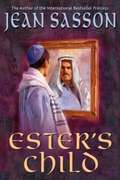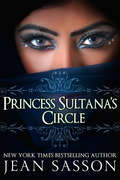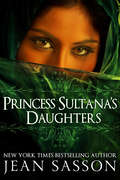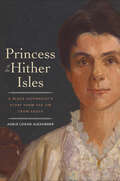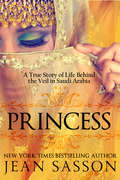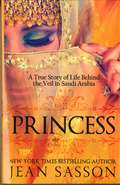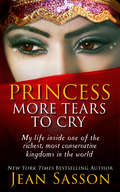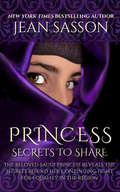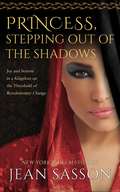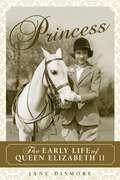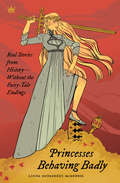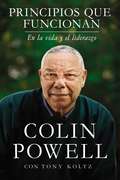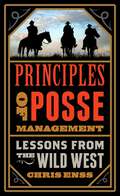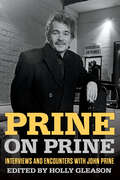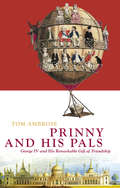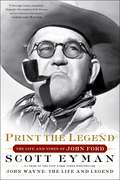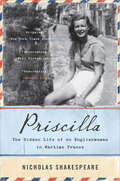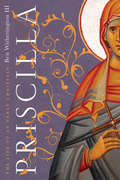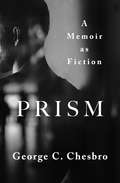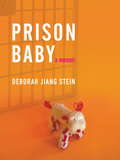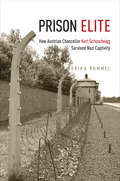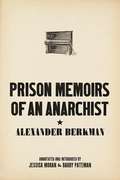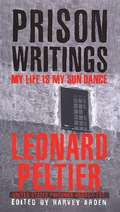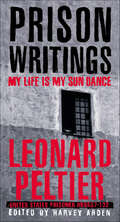- Table View
- List View
Princess Sultana's Circle
by Jean SassonThis is Jean Sasson's compelling sequel to her previous bestsellers, Princess and Princess Sultana's Daughters. This is the final book in the trilogy. With Princess Sultana's Circle, the extraordinary story of Sultana continues. The forced marriage of Sultana's niece to a cruel and depraved older man, and Sultana's discovery of the harem of sex slaves kept by a royal cousin, make her more determined than ever to fight the oppression of women in Saudi Arabia. Princess Sultana's Circle paints a horrifying reality for women of the desert Kingdom. It is a haunting look at the danger of Saudi male dominance and the desperate lives of the women they rule.
Princess Sultana's Circle (Princess Trilogy #3)
by Jean SassonThe powerful true story of Sultana continues with PRINCESS SULTANA'S CIRCLE, the third book in Jean Sasson's internationally best selling Princess Trilogy. The forced marriage of Sultana’s niece to a cruel and depraved older man, and Sultana’s discovery of the harem of sex slaves kept by a royal cousin, make her more determined than ever to fight the oppression of women in Saudi Arabia. PRINCESS SULTANA'S CIRCLE paints a horrifying reality for women of the desert Kingdom. It is a haunting look at the danger of Saudi male dominance and the desperate lives of the women they rule.A New York Times bestseller, PRINCESS was named one of the 500 Great Books by Women since 1300. It was also an Alternate Selection of the Literary Guild and Doubleday Book Club and a Reader's Digest Selection.
Princess Sultana's Daughters
by Jean SassonThis is the second book in the Princess Trilogy. Princess Sultana continues her story. This is a Saudi Arabian woman's intimate revelations about sex, love, marriage and the fate of her beautiful daughters behind the veil
Princess Sultana's Daughters: Princess; Princess Sultana's Daughters; Princess Sultana's Circle (Princess #2)
by Jean SassonIn the compelling second novel of the Princess series, Jean Sasson and Princess Sultana turn the spotlight on Sultana's two teenage daughters, Maha and Amani. As second generation members of the royal family who have benefited from Saudi oil wealth, Maha and Amani have been surrounded by untold opulence and luxury since the day they were born. And yet, they are stifled by the unbearably restrictive lifestyle imposed on them, driving them to desperate measures. While exploring the troubles of Princess Sultana's daughters, Sultana and Sasson never tire in their quest to expose the injustices Saudi Arabian society levels against women. Princess Sultana once more strikes a chord among all women who are lucky enough to have the freedom to speak out for themselves.
Princess of the Hither Isles: A Black Suffragist's Story from the Jim Crow South
by Adele Logan AlexanderA compelling reconstruction of the life of a black suffragist, Adella Hunt Logan, blending family lore, historical research, and literary imagination"Both a definitive rendering of a life and a remarkable study of the interplay of race and gender in an America whose shadows still haunt us today.&”—Henry Louis Gates, Jr.&“If you combine the pleasures of a seductive novel, discovering a real American heroine, and learning the multiracial history of this country that wasn't in our textbooks, you will have an idea of the great gift that Adele Logan Alexander has given us.&”—Gloria Steinem Born during the Civil War into a slaveholding family that included black, white, and Cherokee forebears, Adella Hunt Logan dedicated herself to advancing political and educational opportunities for the African American community. She taught at Alabama&’s Tuskegee Institute but also joined the segregated woman suffrage movement, passing for white in order to fight for the rights of people of color. Her determination—as a wife, mother, scholar, and activist —to challenge the draconian restraints of race and gender generated conflicts that precipitated her tragic demise. Historian Adele Logan Alexander—Adella Hunt Logan&’s granddaughter—portrays Adella, her family, and contemporaries such as Booker T. Washington, Susan B. Anthony, Frederick Douglass, George Washington Carver, Theodore Roosevelt, and W. E. B. Du Bois. Alexander bridges the chasms that frustrate efforts to document the lives of those who traditionally have been silenced, weaving together family lore, historical research, and literary imagination into a riveting, multigenerational family saga.
Princess: A True Story of Life Behind the Veil (Princess Trilogy #Bk. 1)
by Jean SassonIn this updated 20th anniversary edition, PRINCESS describes the life of Princess Sultana Al Sa'ud, a princess in the royal house of Saudi Arabia. Hidden behind her black veil, she is a prisoner, jailed by her father, her husband and her country.Sultana tells of appalling oppressions, everyday occurrences that in any other culture would be seen as shocking human rights violations: thirteen-year-old girls forced to marry men five times their age, young women killed by drowning, stoning, or isolation in the "women's room."PRINCESS is a testimony to a woman of indomitable spirit and courage, and you will never forget her or her Muslim sisters.A New York Times bestseller, PRINCESS was named one of the 500 Great Books by Women since 1300. It was also an Alternate Selection of the Literary Guild and Doubleday Book Club and a Reader's Digest Selection.
Princess: A True Story of Life Behind the Veil in Saudi Arabia
by Jean SassonThis is a true story of life behind the veil for princess Sultana in Saudi Arabia. Book 1 in the trilogy
Princess: More Tears To Cry (Princess #4)
by Jean SassonThrough advances in education and access to work, Saudi women are breaking through barriers; they are becoming doctors, social workers, and business owners. Major steps forward have been made, but the struggle for basic human rights continues. Sadly, despite changes in the law, many women are still subjected to horrific oppression, violence, and psychological and physical abuse. This fourth book in the internationally acclaimed Princess series reveals the intimate struggles of Saudi women inside one of the richest, most conservative kingdoms in the world. These are stories of triumph and heartbreak amongst the highest- and lowest-born. Princess Sultana speaks frankly about her strong-willed daughters, her beloved husband, and the contentious Al-Sa'ud family whose daily battles about what it means to be a woman in Saudi Arabia mirror those of the society at large.
Princess: Secrets to Share
by Jean SassonSECRETS TO SHARE is Jean Sasson's explosive and riveting new book. As the world's attention traces the reluctant social advances in the Middle East, Princess Sultana and her female friends and family have stepped forward to rescue young women in the region who are cruelly mistreated by their husbands, their fathers and the brutish ISIS soldiers who kidnap them. But inside the Princess's lavish Saudi Arabian palace, sparks of anger and bolts of fear crackle because of the secrets kept to forward her efforts to help women and children. Kareem is furious when Sultana guards Maha's secret to volunteer to help traumatized children at a refugee camp in Turkey. When a beautiful Yemeni woman visits the royal palaces of Saudi Arabia, Sultana is saddened, yet mesmerized to be told the story of the woman's seven marriages. Meanwhile, Kareem's father takes a new wife -- and Princess Sultana is blamed. Jean Sasson is author of thirteen bestselling books, including New York Times bestseller PRINCESS: A True Story of Life Behind the Veil in Saudi Arabia and of GROWING UP BIN LADEN: Osama's Wife and Son Take Us Inside Their Secret World.
Princess: Stories of Joy and Sorrow in a Kingdom on the Threshold of Revolutionary Change (Princess Trilogy #Bk. 1)
by Jean SassonSome things never change—even in the life of a Saudi Princess! Whether it is entertaining guests in her decadent palace, jet-setting between four mansions on three different continents, or receiving opulent jewels from her adoring husband, the royal lifestyle is nothing new to Princess Sultana Al Sa’ud. And neither are the antics of the Royal Family: from a niece who constantly steals from her to a sister obsessed with having the lips of Angelina Jolie. And of course there’s Sultana’s bullish brother who is convinced that her outspokenness will be the ruin of the Royal Family! But miraculous change is also in the air. The young Saudi Crowned Prince has proclaimed his plan to give Saudi women more freedoms, including the right to drive! Princess Sultana exults as her beloved Kingdom moves further away from the days of infant girls buried in sand and women battered by stones or the fists of their husbands. Even as a bright, new day lingers on the horizon, Saudi women’s biggest obstacle still lurks in the shadows—the Guardianship Law. Will Saudi Arabia forever be plagued with men who doubt women’s capacity to make their own decisions? Will the winds of change wither to a whisper? Whatever may occur, Princess, Stepping Out of the Shadows proves that nothing is simple in Saudi Arabia.
Princess: The Early Life of Queen Elizabeth II
by Jane DismoreIn November 2017 the Queen and the Duke of Edinburgh celebrated their 70th wedding anniversary. As a 13-year-old Princess, she fell in love with Prince Philip of Greece, an ambitious naval cadet, and they married when she was 21; when she suddenly became Queen at 25, their lives changed forever. Philip has been her great support, but fortunately she also had a solid foundation that helped prepare her for a life dedicated to duty. With previously unpublished material and unique memories from friends and relatives who have known her since childhood, this book looks afresh and in richer depth at her life as Princess, glittering yet isolating. Vivid detail and anecdotes reveal more about her, the era in which she grew up and the people who shaped her life. The archives of royal confidante Lady Desborough and Private Secretary Sir Alec Hardinge reveal unseen letters from the Princess and the royal family, giving intimate insights into their lives and minds. Here is her sadness at the death of her nanny, Alah; her joy in her children; her melancholy as a young wife when Philip returns to his ship; the sensitivities of her father. Here too is the Princess with the aristocratic Bowes Lyons, her mother&’s family, who featured significantly in her life, yet rarely appear in books. The author sheds new light on anomalies surrounding the birth of her mother who, it has been asserted, was the daughter of the family&’s cook. The strain of wartime on the royal family is highlighted in new material contrasting the stance of the Princess&’s uncles, the Duke of Windsor and David Bowes Lyon. In contrast with her upbringing, Philip&’s early life was turbulent, although their lives shared some interesting parallels. Lady Butter, a relation of Philip and friend of the Princess, recalls time spent with each of them; and unpublished documents show how intelligence agencies considered the socialist influence of the Mountbattens on Philip and thus on the royal court.More importantly, Princess traces how an &“ordinary country girl&” suddenly found herself in the line of succession to the crown at age ten when her Uncle, the Duke of Windsor, abdicated the throne to his brother Albert (&“Bertie&” to family and friends), the once and future King George VI. Breaking new ground for a future English monarch, she became the first female member of the royal family to serve on active duty during World War II, and broke tradition by sending her children away to school rather having them privately tutored. Indeed, by the time of her coronation in 1953, she had already achieved a &“broad and solid background from which she could draw during the rapidly changing times of her long reign. Out of a little princess they made a Queen.&”
Princesses Behaving Badly: Real Stories From History Without The Fairy-tale Endings
by Linda Rodriguez McrobbieYou think you know her story. You've read the Brothers Grimm, you've watched the Disney cartoons, and you cheered as these virtuous women lived happily ever after. But real princesses didn't always get happy endings. Sure, plenty were graceful and benevolent leaders, but just as many were ruthless in their quest for power--and all of them had skeletons rattling in their royal closets. Princess Stephanie von Hohenlohe was a Nazi spy. Empress Elisabeth of the Austro-Hungarian empire slept wearing a mask of raw veal. Princess Olga of Kiev slaughtered her way to sainthood while Princess Lakshmibai waged war on the battlefield, charging into combat with her toddler son strapped to her back. Princesses Behaving Badly offers true tales of all these princesses and dozens more in a fascinating read that's pefect for history buffs, feminists, and anyone seeking a different kind of bedtime story.
Principios que funcionan: En la vida y el liderazgo
by Colin PowellEste libro es una colección de lecciones y anécdotas personales que han formado la carrera en el servicio público del general de cuatro estrellas y anterior Secretario de Estado Colin Powell. En el corazón de este libro se encuentran las «13 reglas», notas que él ha acumulado en su escritorio, y ahora son base de sus presentaciones de liderazgo en todo el mundo. Las reglas cortas y sencillas de Powell como «enójate y luego supéralo» y «comparte crédito» salen a la luz al revelar historias personales que presentan y amplían sus principios para el liderazgo efectivo: convicción, trabajo duro, y sobre todo, respeto por otros. En el trabajo y en la vida, Powell escribe «es el gesto humano lo que cuenta». Una convincente narrador, Powell comparte las parábolas tanto humorísticas como solemnes que ofrecen sabios consejos sobre cómo triunfar en el lugar de trabajo y más allá. «Confía en tu gente», aconseja mientras delega pequeñas responsabilidades presidenciales a dos ayudantes principiantes. «Haz lo mejor alguien está viendo», les aconseja a aquellos que recién están comenzando, al recordar su propio trabajo de verano cuando era adolescente enviando cajas de soda. Powell combina el conocimiento que ha ganado al servir en los altos rangos de la milicia y en cuatro administraciones presidenciales, así como también las lecciones aprendidas de una crianza difícil en el Bronx y su entrenamiento en ROTC. El resultado es un retrato poderoso de un líder que es prudente, modesto y agradecido por las contribuciones de cada una de las personas con las que trabaja. Este libro de Colin Powell está hecho para inspirar, conmover y sorprender a los lectores. Profundo y revelador, es un brillante y original modelo de liderazgo.
Principles of Posse Management: Lessons from the Old West for Today's Leaders
by Chris EnssPrinciples of Posse Management tells the stories of the lawmen and leaders of the Old West who organized citizens in the pursuit of law and order. This collection of tales reveals what Wyatt Earp, Bat Masterson, and other legends of the old west knew about leadership with a clever twist on the classic shoot-em-up, black-hats-vs-white-hats tale.
Prine on Prine: Interviews and Encounters with John Prine (Musicians in Their Own Words #20)
by Holly Gleason"As close to an autobiography as we're going to get from John Prine, Prine on Prine captures the inimitable, whimsical voice of one of our greatest songwriters . . . Nashville legend Holly Gleason knew the man and assembled this brilliant collection with a knowing eye and loving heart." —Joel Selvin, author of Fare Thee Well: The Final Chapter of the Grateful Dead's Long, Strange Trip and other booksCurated by a critic who knew him across five decades, Prine on Prine distills the essence of an iconic American writer: unguarded, unfiltered and real. In his own words, in his own time—on the road, in the kitchen, the Library of Congress, radio shows, movie scripts, and beyond. John Prine hated giving interviews, but he said much when he talked. Embarrassed by fame, delighted by the smallest things, the first songwriter to read at the Library of Congress, and winner of the Pen Award for Literary Excellence, Prine saw the world unlike anyone else. The songs from 1971's John Prine remain spot-on takes of the human condition today, and his writing only got richer, funnier, and more incisive. The interviews in Prine on Prine trace his career evolution, his singular mind, his enduring awareness of social issues, and his acute love of life, from Studs Terkel's radio interviews from the early '70s to Mike Leonard's Today Show packages from the '80s, Cameron Crowe's early encounter to Ronni Lundy's Shuck Beans, Stack Cake cookbook, and Hot Rod magazine to No Depression's cover story, through today. Editor Holly Gleason enjoyed a longstanding relationship with Prine and his longtime co-manager, and she often traveled with him on tours in the late 1980s and represented him in the 2000s.
Prinny and His Pals: George IV and the Remarkable Gift of Royal Friendship
by Tom AmbroseFrom the first biography of George IV in 1831 to the last in 2001, Mad King George's son has commonly been held up to ridicule as a weak, selfish, and incompetent spendthrift, barely tolerated by his ministers, loathed by most of his family, and dependent on the emotional support of grasping mistresses. However, acclaimed historian Tom Ambrose--author of Godfather of the Revolution: The Life of Phillipe Egalité, Duc D'Orléans--has uncovered new details on "Prinny" that suggests that, for all his faults, George IV just may have been the most humane and amusing of all British monarchs, notwithstanding his love of the high life. Central to the story is the vast array of friends that populate a remarkable reign as Prince Regent and King. If Prinny, as they knew him, was so grotesquely foolish, how did he amass such a fascinating (and loyal) group of friends? Could any other British ruler count among his friends the country's most brilliant playwright (Richard Sheridan), or the wiliest statesman (Charles Fox), or the greatest political philosopher (Edmund Burke), not to mention perhaps the biggest loveable rogues' gallery London ever saw? The truth was that Prinny's occasional buffoonery and imposing girth made him the perfect target for political satirists and cartoonists--at their zenith during his reign--and his high qualities have been consistently overlooked. This warm, funny, and affectionate portrait displays George at his very best: delighting some of the finest minds of his generation, easily winning over his subjects and his family as well as treating his lovers with care and concern--and roistering with all his pals.
Print the Legend: The Life and Times of John Ford
by Scott Eyman"When the legend becomes fact, print the legend." This line comes from director John Ford's film, The Man Who Shot Liberty Valance, but it also serves as an epigram for the life of the legendary filmmaker. Through a career that spanned decades and included work on dozens of films -- among them such American masterpieces as The Searchers, The Grapes of Wrath, The Quiet Man, Stagecoach, and How Green Was My Valley -- John Ford managed to leave as his legacy a body of work that few filmmakers will ever equal. Yet as bold as the stamp of his personality was on each film, there was at the same time a marked reticence when it came to revealing anything personal. Basically shy, and intensely private, he was known to enjoy making up stories about himself, some of them based loosely on fact but many of them pure fabrications. Ford preferred instead to let his films speak for him, and the message was always masculine, determined, romantic, yes, but never soft -- and always, always totally "American." If there were other aspects to his personality, moods and subtleties that weren't reflected on the screen, then no one really needed to know. Indeed, what mattered to Ford was always what was up there on the screen. And if it varied from reality, what did it matter? When you are creating legend, fact becomes a secondary matter. Now, in this definitive look at the life and career of one of America's true cinematic giants, noted biographer and critic Scott Eyman, working with the full participation of the Ford estate, has managed to document and delineate both aspects of John Ford's life -- the human being and the legend. Going well beyond the legend, Eyman has explored the many influences that were brought to play on this remarkable and complex man, and the result is a rich and involving story of a great film director and of the world in which he lived, as well as the world of Hollywood legend that he helped to shape. Drawing on more than a hundred interviews and research on three continents, Scott Eyman explains how a saloon-keeper's son from Maine helped to shape America's vision of itself, and how a man with only a high school education came to create a monumental body of work, including films that earned him six Academy Awards -- more than any filmmaker before or since. He also reveals the truth of Ford's turbulent relationship with actress Katharine Hepburn, recounts his stand for freedom of speech during the McCarthy witch-hunt -- including a confrontation with archconservative Cecil B. DeMille -- and discusses his disfiguring alcoholism as well as the heroism he displayed during World War II. Brilliant, stubborn, witty, rebellious, irascible, and contradictory, John Ford remains one of the enduring giants in what is arguably America's greatest contribution to art -- the Hollywood movie. In Print the Legend, Scott Eyman has managed at last to separate fact from legend in writing about this remarkable man, producing what will remain the definitive biography of this film giant.
Priscilla: The Hidden Life of an Englishwoman in Wartime France
by Nicholas ShakespeareWhen Nicholas Shakespeare stumbled across a box of documents belonging to his late aunt, Priscilla, he was completely unaware of where this discovery would take him and what he would learn about her hidden past. The glamorous, mysterious figure he remembered from his childhood was very different from the morally ambiguous young woman who emerged from the trove of love letters, photographs, and journals, surrounded by suitors and living the dangerous existence of a British woman in a country controlled by the enemy. He had heard rumors that Priscilla had fought in the Resistance, but the truth turned out to be far more complicated.As he investigated his aunt's life, dark secrets emerged, and Nicholas discovered the answers to the questions over which he'd been puzzling: What caused the breakdown of Priscilla's marriage to a French aristocrat? Why had she been interned in a prisoner-of-war camp, and how had she escaped? And who was the "Otto" with whom she was having a relationship as Paris was liberated?Piecing together fragments of one woman's remarkable and tragic life, Priscilla is at once a stunning story of detection, a loving portrait of a flawed woman trying to survive in terrible times, and a spellbinding slice of history.
Priscilla: The Life of an Early Christian
by Ben Witherington IIIWho was Priscilla? Readers of the Bible may know her as the wife of Aquila, Paul's coworker, or someone who explained baptism to Apollos. Biblical references to Priscilla spark questions: Why is she mentioned before her husband? Does the mention of her instruction of Apollos mean that women taught in the church? What is her story? Ben Witherington addresses these questions and more. In this work of historical fiction, Priscilla looks back on her long life and remembers the ways she has participated in the early church. Her journey has taken her to Ephesus, Corinth, and Rome, and she's partnered with Paul and others along the way. Priscilla's story makes the first-century world come alive and helps readers connect the events and correspondence in different New Testament books. Witherington combines biblical scholarship and winsome storytelling to give readers a vivid picture of an important New Testament woman.
Prism: A Memoir as Fiction
by George C. ChesbroThe author of the Mongo Mysteries reveals the interior life of a troubled writer in this deeply personal autobiographical novel. At the age of fifty-eight, author Garth Fugue is adrift. For the last forty years he has poured his soul into twenty-three novels and countless short stories, all filled with murder and mayhem. By delving into the troubled minds of his characters, he has kept his own demons at bay. Now, Garth is at a crossroads. Despite his floundering literary career, he is attempting to write his magnum opus while simultaneously teaching at a children&’s psychiatric hospital. As he decides what to write about, Garth must ultimately wrestle with his own beliefs about humanity, morality, and the meaning of it all. In this insightful novel, George C. Chesbro exposes a fictional writer&’s tortured mind and, in doing so, divulges the struggles of the real, complicated man best known for penning quirky mysteries and pulpy thrillers. It is an intimate invitation not to be missed.
Prison Baby
by Deborah Jiang SteinA deeply personal and inspiring memoir recounting one woman's struggles--beginning with her birth in prison--to find self-acceptance Prison Baby is a revised and substantially expanded version of Deborah Jiang Stein's self-published memoir, Even Tough Girls Wear Tutus. Even at twelve years old, Deborah, the adopted daughter of a progressive Jewish couple in Seattle, felt like an outsider. Her mixed Asian features set her apart from her white, well-intentioned parents who evaded questions about her past. But when she discovered a letter revealing the truth of her prison birth to a heroin-addicted mother--and that she spent the first year of life in prison--Deborah spiraled into emotional lockdown. For years she turned to drugs, violence, and crime as a way to cope with her grief. Ultimately, Deborah overcame the stigma, shame, and secrecy of her birth, and found peace by helping others--proving that redemption and acceptance are possible even from the darkest corners.From the Trade Paperback edition.
Prison Elite: How Austrian Chancellor Kurt Schuschnigg Survived Nazi Captivity
by Erika RummelAfter the Anschluss (annexation) in 1938, the Nazis forced Austrian Chancellor Kurt Schuschnigg to resign and kept him imprisoned for seven years, until his rescue by the Allies in 1945. Schuschnigg’s privileged position within the concentration camp system allowed him to keep a diary and to write letters which were smuggled out to family members. Drawing on these records, Prison Elite paints a picture of a little-known aspect of concentration camp history: the life of a VIP prisoner. Schuschnigg, who was a devout Catholic, presents his memoirs as a "confession," expecting absolution for any political missteps and, more specifically, for his dictatorial regime in the 1930s. As Erika Rummel reveals in fascinating detail, his autobiographical writings are frequently unreliable. Prison Elite describes the strategies Schuschnigg used to survive his captivity emotionally and intellectually. Religion, memory of better days, friendship, books and music, and maintaining a sense of humour allowed him to cope. A comparison with the memoirs of fellow captives reveals these tactics to be universal. Studying Schuschnigg’s writing in the context of contemporary prison memoirs, Prison Elite provides unique insight into the life of a VIP prisoner.
Prison Memoirs of an Anarchist
by Barry Pateman Alexander Berkman Jessica Moran"A book of rare power and beauty, majestic in its structure, filled with the truth of imagination and the truth of actuality, emphatic in its declarations and noble in its reach."-Bayard Boyesen, Mother Earth. "No other book discusses so frankly the criminal ways of the closed prison society."- Kenneth RexrothIn 1892, Alexander Berkman tried to assassinate Henry Clay Frick for the latter's role in violently suppressing the Homestead Steel Strike. Berkman's attempt was unsuccessful. Berkman spent the next fourteen years in Pennsylvania's Western Penitentiary. Upon release, he wrote what was to become a classic of prison literature, and a profound testament to human courage in the face of oppression.This new edition of his account of those years is introduced and fully annotated by Barry Pateman and Jessica Moran, both former associate editors of the Emma Goldman Papers at the University of California Berkeley. Their efforts make this the definitive version of Berkman's tale of his transformation within prison, his growing sympathy for those he'd considered social parasites, and the intimate relationships he developed with them. Also includes never-before-published facsimile reprints and transcriptions of the diary Berkman kept while he wrote this book, conveying the difficulties he had reliving his experiences.Alexander Berkman (1870-1936) was a leading writer and militant in the anarchist movement and author of the classic primer What is Anarchism?Barry Pateman was associate editor of Emma Goldman: A Documentary History, and editor of Chomsky on Anarchism. He is a historian and member of the Kate Sharpley Library collective.Jessica Moran, was an assistant editor of Emma Goldman: A Documentary History. She is a member of the Kate Sharpley Library collective and is an archivist currently living and working in New Zealand.
Prison Writings: My Life Is My Sun Dance
by Harvey Arden Leonard PeltierFrom the Book Jacket: "A deeply moving and very disturbing story of a gross miscarriage of justice and an eloquent cri de coeur of Native Americans for redress, and to be regarded as human beings with inalienable rights guaranteed under the United States Constitution, like any other citizens. We pray it does not fall on deaf ears. America owes it to herself." (Archbishop Desmond M. Tutu, Nobel Peace Laureate) "It would be inadequate to describe Leonard Peltier's Prison Writings as a classic of prison literature, although it is that. It is also a cry for help, an accusation against monstrous injustice, a beautiful expression of a man's soul, demanding release." (Howard Zinn, author of A People's History of the United States) "Listen to this fresh, brave voice, then inform yourself about the shameful case of Leonard Peltier." (Peter Matthiessen, author of In the Spirit of Crazy Horse) "This book takes the reader on an emotional and spiritual journey as Leonard Peltier's surprisingly hopeful reflections make the terrible injustice of his imprisonment for 24 years even more difficult to accept. Peltier's important journal details his trial and conviction which was based in part on admittedly false testimony and evidence so inconclusive that reasonable people everywhere have concluded that he should be granted clemency." (Wilma Mankiller, former chief of the Cherokee Nation, and author of Mankiller) "Leonard Peltier's words reveal a wise man who has become freer than his captors, despite his false imprisonment for a crime he did not commit. His thoughts here remind us of our true mission as Indian people, as human beings here on this humble, beautiful planet. These thoughts cannot be captured or locked behind bars, or destroyed by gunfire. They fly free." (Joy Harjo, Muskoke poet and musician, author of The Woman Who Fell From the Sky) "If you care about justice, read this brave book. If you care about the perpetuation of the white man's justice against the Native American, you must know the Leonard Peltier story." (Gerry Spence, author of Give Me Liberty!) Harvey Arden is the author and co-author of several books, including Wisdomkeepers and Travels in a Stone Canoe (both with Steve Wall) and Noble Red Man. He lives in Washington, DC. Other books by Harvey Arden are available from Bookshare.
Prison Writings: My Life Is My Sun Dance
by Leonard PeltierThe Native American activist recounts his evolution into a political organizer, his trial and conviction for murder, and his spiritual journey in prison.In September of 2022, twenty-five years after Leonard Peltier received a life sentence for the murder of two FBI agents, the Democratic National Committee unanimously passed a resolution urging President Joe Biden to release him. Peltier has affirmed his innocence ever since his sentencing in 1977—his case was made fully and famously in Peter Matthiessen’s bestselling In the Spirit of Crazy Horse—and many remain convinced he was wrongly convicted.A wise and unsettling book, Prison Writings is both memoir and manifesto, chronicling Peltier’s life in Leavenworth Prison in Kansas. Invoking the Sun Dance, in which pain leads one to a transcendent reality, Peltier explores his suffering and the insights it has borne him. He also locates his experience within the history of the American Indian peoples and their struggles to overcome the federal government’s injustices.Edited by Harvey Arden, with an introduction by Chief Arvol Looking Horse, and a preface by former Attorney General Ramsey Clark.Praise for Prison Writings“It would be inadequate to describe Leonard Peltier’s Prison Writings as a classic of prison literature, although it is that. It is also a cry for help, an accusation against monstrous injustice, a beautiful expression of a man’s soul, demanding release.” —Howard Zinn, author of A People’s History of the United States“For too long, both Leonard’s supporters and detractors have seen him as a metaphor, as a public figure worthy of political rallies and bumper stickers, but very rarely as a private man who only wants to go home. I pray this book will bring Leonard home.” —Sherman Alexie, author of Indian Killer
